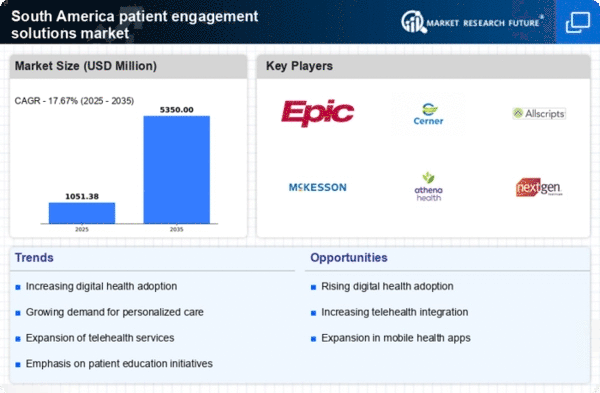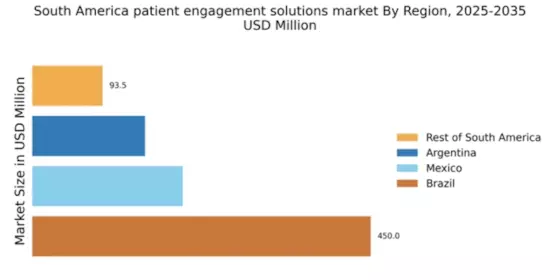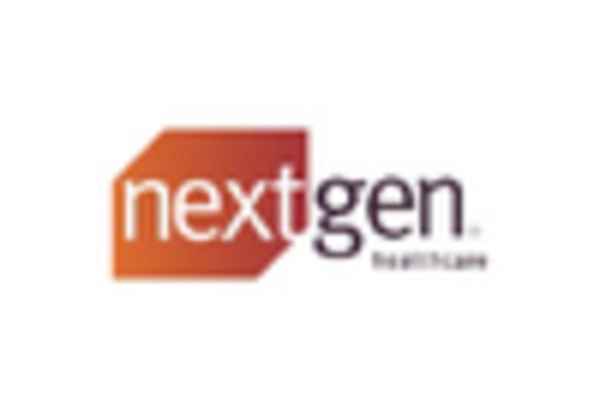Rising Healthcare Costs
The patient engagement-solutions market in South America is significantly influenced by the rising costs associated with healthcare. As healthcare expenses continue to escalate, patients are increasingly seeking ways to manage their health more effectively. This has led to a greater emphasis on patient engagement solutions that empower individuals to take control of their health and wellness. In 2025, healthcare spending in South America is projected to reach $500 billion, prompting both patients and providers to prioritize cost-effective engagement strategies. By utilizing digital tools and platforms, patients can access information, track their health metrics, and communicate with healthcare professionals, thereby reducing unnecessary expenditures. This shift towards cost management is expected to drive growth in the patient engagement-solutions market.
Growing Focus on Preventive Healthcare
The patient engagement-solutions market in South America is witnessing a growing focus on preventive healthcare measures. As awareness of health issues increases, patients are more inclined to engage in proactive health management. This shift is reflected in the rising adoption of patient engagement solutions that promote preventive care, such as health education programs and wellness tracking tools. In 2025, it is projected that 25% of healthcare expenditures in South America will be allocated to preventive services, highlighting the importance of early intervention. By leveraging patient engagement solutions, healthcare providers can foster a culture of prevention, encouraging patients to participate actively in their health journeys. This trend is expected to drive the growth of the patient engagement-solutions market as more individuals seek to prevent chronic diseases and improve their overall well-being.
Emphasis on Patient-Centric Care Models
The patient engagement-solutions market in South America is increasingly characterized by an emphasis on patient-centric care models. Healthcare providers are recognizing the importance of involving patients in their own care processes, leading to improved health outcomes and satisfaction. As of 2025, approximately 60% of healthcare organizations in South America are adopting patient-centric approaches, which prioritize the needs and preferences of patients. This shift encourages the development of engagement solutions that facilitate communication, education, and shared decision-making between patients and providers. By fostering a collaborative environment, healthcare organizations can enhance patient loyalty and adherence to treatment plans. Consequently, the patient engagement-solutions market is likely to expand as more providers invest in technologies that support patient-centered care.
Technological Advancements in Healthcare
Technological advancements play a crucial role in shaping the patient engagement-solutions market in South America. Innovations such as mobile health applications, wearable devices, and artificial intelligence are transforming how patients interact with healthcare systems. As of 2025, it is estimated that over 40% of South American patients use mobile health applications to monitor their health, indicating a strong inclination towards technology-driven solutions. These advancements facilitate real-time communication between patients and providers, enhancing engagement and adherence to treatment plans. Moreover, the integration of AI in patient engagement tools allows for personalized experiences, catering to individual health needs. This technological evolution is likely to propel the patient engagement-solutions market forward, as healthcare providers increasingly adopt these tools to improve patient outcomes.
Increasing Demand for Telehealth Services
The patient engagement-solutions market in South America experiences a notable surge in demand for telehealth services. This trend is driven by the growing need for accessible healthcare, particularly in remote areas where traditional healthcare facilities may be limited. As of 2025, approximately 30% of patients in South America utilize telehealth services, indicating a shift towards digital solutions. The convenience of virtual consultations enhances patient engagement, allowing for timely follow-ups and continuous monitoring of health conditions. This increasing reliance on telehealth not only improves patient satisfaction but also encourages healthcare providers to adopt innovative engagement solutions. Consequently, the patient engagement-solutions market is likely to expand as more healthcare organizations integrate telehealth into their service offerings.


















Leave a Comment